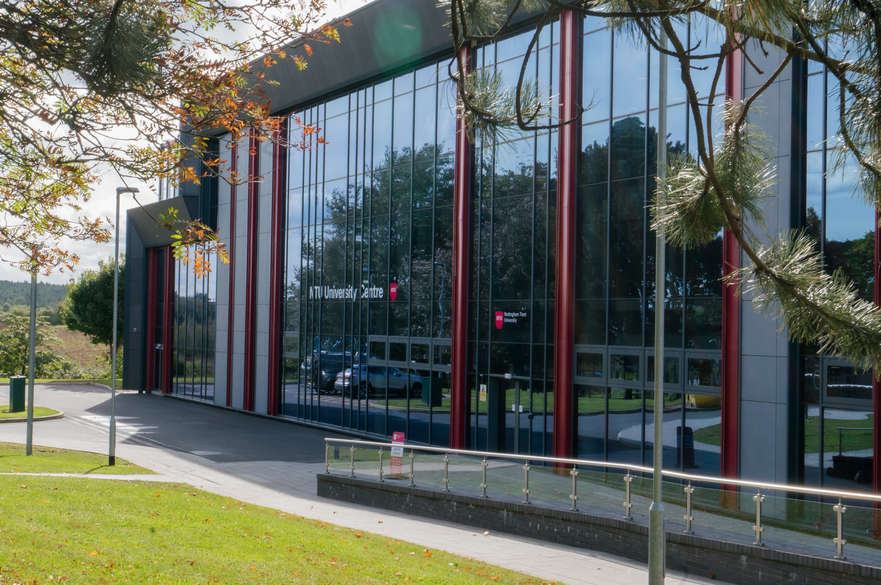Computing for England (Network Engineering) - NTU in Mansfield Higher National Diploma
UCAS code: I103 (Full time)
About this course
The HND Computing for England (Network Engineering) course at NTU in Mansfield offers an advanced level of study in the field of computing. You’ll build on core computing skills, gaining in-depth knowledge of network design, management, and security, while exploring topics such as data communications and network infrastructure.
Throughout the course, you will engage with modern tools and technologies, preparing for a wide range of careers in the computing and network engineering sectors. With practical, hands-on learning and access to state-of-the-art facilities, you’ll develop the expertise needed to tackle real-world challenges and stay ahead in this rapidly evolving field.
NTU’s strong links with industry ensure that you are learning up-to-date, relevant content, with plenty of opportunities to connect with professionals. By the end of the course, you will be well-equipped with the skills and confidence needed to excel in network engineering roles across various industries.
Visit us
Visiting us is the perfect way to see what makes life and learning at NTU in Mansfield special. Book your place on an upcoming site tour to experience some of our teaching and learning spaces.
-
You'll study at NTU in Mansfield, where you'll have access to fantastic buildings, and all of the tools and technology you need for studying on this course.
-
This course prepares you to progress into a range of roles in computing.
-
On completing the course, you will be eligible to top up to degree level by taking the final year of one of our BSc Computer Science courses at our Clifton Campus.
What you’ll study
You'll study 120 credit points over seven core modules.
Computing Research Project (30 Credit Points)
In this module you’ll explore and examine a current topical aspect of computing in the context of a business environment and their chosen specialist pathway. Working on your project will develop your research, presentation and problem solving skills.
Business Process Support (15 Credit Points)
Discover the importance of data and how to turn it in to valuable information which can be used to make business decisions. Looking at real business problems, you’ll learn how data science can be used to optimise business processes.
Transport Network Design (15 Credit Points)
Exponential growth of the internet has put unprecedented demand on networking infrastructures. You’ll be introduced to enterprise network design principles, design models, scalable networks and their effectiveness in supporting business requirements. As well as evaluating Wide Area Networks (WAN) you’ll be solving network-related issues using network monitoring and troubleshooting methods and techniques.
Cloud Computing (15 Credit Points)
Understand the concept, architecture and services of cloud computing. You’ll have hands-on experience of configuring a cloud service from major providers such as ECM, Google, Amazon, Microsoft and IBM as well as implementing a simple cloud platform using open-source software. This module is aligned with the Microsoft Azure Fundamentals Certification.
Network Security (15 Credit Points)
During this module you’ll be introduced to a range of network security measures and protocols, and cryptographic types and configuration settings of network security environments. You’ll learn how to test the security of a network to identify and fix any weaknesses.
Robotics (15 Credit Points)
Robots and autonomous systems are becoming more widely used, with applications ranging from agriculture to manufacturing. You’ll gain experience by building a robot for yourself while considering the range of practical applications and implications of using robotic systems.
Emerging Technologies (15 Credit Points)
Computing underpins many emerging technologies, which can help solve problems, improve performance and efficiency, or even create entirely new scientific fields. By studying the most promising and impactful current emerging technologies, you’ll understand the benefits and potential impacts that emerging technologies have in relation to the development of software applications and business practices.
We regularly review and update our course content based on student and employer feedback, ensuring that all of our courses remain current and relevant. This may result in changes to module content or module availability in future years.
How you're taught
The full-time course is delivered over two or three days and the part-time route is one day per week, allowing you to fit your study around other commitments.
Outside of timetabled sessions, you'll need to undertake self-directed independent study. This will include preparing for seminars, researching, completing coursework, and directed reading to expand your knowledge.
Seminars and lab sessions
You'll have seminars and lab sessions, where you'll apply theory learned to real-world situations. These sessions involve active learning and are driven by collaboration with your tutors and classmates. Due to the smaller class sizes, this approach enables individualised support to ensure you reach your learning potential.
How you're assessed
You'll be assessed using a variety of methods including :
- Group work
- Presentations
- Practical Demonstrations
- Workshops
There are no exams used for assessment during this course.
Careers and employability
This course has been awarded the Higher Technical Qualification quality mark by the Institute for Apprenticeships and Technical Education. This shows the course is suitable if you want a career in the computing industry.
This course is equivalent to the second year of a degree, so you'll be well placed for a range of careers in computing, including network engineering, software engineering, data analytics, security, intelligent systems, applications development and testing.
This course has been developed in close consultation with employers local to the Mansfield area. There is demand locally for students with digital skills in the programming, networking and security areas from organisations in the health, engineering insurance and IT sectors.
Further study
Students who successfully complete this course can study for a full degree by taking the final year of one of our BSc Computer Science courses at our Clifton Campus.
Employability team
Our expert Employability team will work closely with you at every stage of your career planning, providing personal support and advice. You can benefit from this service at any time during your studies and for up to three years after completing your course.
NTU Enterprise
You'll also have the opportunity to turn your ideas into a viable business with help from NTU Enterprise, NTU's purpose-built Centre for Entrepreneurship and Enterprise, a support centre to help students create, develop and grow their own businesses.
Campus and facilities
As an NTU Mansfield student, you’ll benefit from the latest facilities and modern technology to support your studies and help you get the most out of student life.
We are continually investing in our facilities and enhancing our learning and teaching environment to make it an inspiring place for students.
Facilities and services include:
- University Centre
- Teaching and Learning Centre
- CAD suite
- Robotics, hydraulics and pneumatics test equipment
- Electronics equipment
- Library
- Dedicated study zones, including PC suites
- On-site café
- Social spaces
- Sports facilities
- Student Support Services
- Nottingham Trent Students Union (NTSU) drop-in events.
Entry requirements
- Higher National Certificate in Computing or Engineering or equivalent
- GCSEs – English and Maths grade C / 4.
Other qualifications and experience
The following qualifications will also be considered:
- Other related Level 4 qualifications
- Relevant work experience, or an international equivalent to the above qualifications.
We may also consider credits achieved at other universities and your work/life experience through an assessment of prior learning. This may be for year one entry, or beyond the beginning of a course where applicable, for example, into year 2.
Our Recognition of Prior Learning and Credit Transfer Policy outlines the process and options available for this route.
Getting in touch
If you need more help or information, get in touch through our enquiry form
This course is not suitable for students who require a Student Visa
We accept qualifications from schools, colleges and universities all over the world for entry onto our undergraduate and postgraduate degrees. If you’re not sure how your international qualification matches our course requirements please visit our international qualifications page.
We have undergraduate Engineering courses which are suitable for Student Visa applicants. Here is a list of all the undergraduate courses we offer.
Fees and funding
Preparing for the financial side of student life is important, but there's no need to feel anxious and confused about it. Take a look at our fees and funding pages for lots of handy advice and guidance.
*Please note that if you are considering a course that runs over more than one year, the tuition fee stated is for the first year of study. The course fee for the second year may be subject to annual review.
2025 entry fees are:
Home (UK) tuition fee
- £9,535 (Full-time)
Bursaries
A university bursary is an award that can help those who may not have otherwise been able to afford to attend university. We offer the following cash bursaries to prospective students:
- NTU Bursaries for 2024 entry
- Nursing, Teacher Training and Social Work Bursaries
- NTU Opportunity Bursary
- NTU Care Leavers and Foyer Resident Bursary
- NTU Estranged Student Bursary
Find out more about bursaries
Scholarships
University scholarships help to fund studies and are awarded to exceptional students with achievements or high potential in both academic and extracurricular fields.
Find out more about scholarships
Getting in touch
For more advice and guidance, you can contact our Student Financial Support Service.
Tel: +44 (0)115 848 2494
This course is not suitable for students who require a Student Visa
We accept qualifications from schools, colleges and universities all over the world for entry onto our undergraduate and postgraduate degrees. If you’re not sure how your international qualification matches our course requirements please visit our international qualifications page.
We have undergraduate Engineering courses which are suitable for Student Visa applicants. Here is a list of all the undergraduate courses we offer.
How to apply
For the full-time course, apply through UCAS. The UCAS code is I103.
For the part-time course, apply directly through our portal.
As part of your application, you’ll submit a personal statement. Tell us about your ambitions, skills and experience. You have 4,000 characters to impress us – here’s how to make your words count.
Keeping up to date
After you've applied, we'll be sending you important emails throughout the application process – so check your emails regularly, including your junk mail folder.
You can get more information and advice about applying to NTU on our Your Application page.
This course is not suitable for Student Visa applicants.
We accept qualifications from schools, colleges and universities all over the world for entry onto our undergraduate and postgraduate degrees. If you’re not sure how your international qualification matches our course requirements please visit our international qualifications page.
We have undergraduate Engineering courses which are suitable for Student Visa applicants. Here is a list of all the undergraduate courses we offer.







